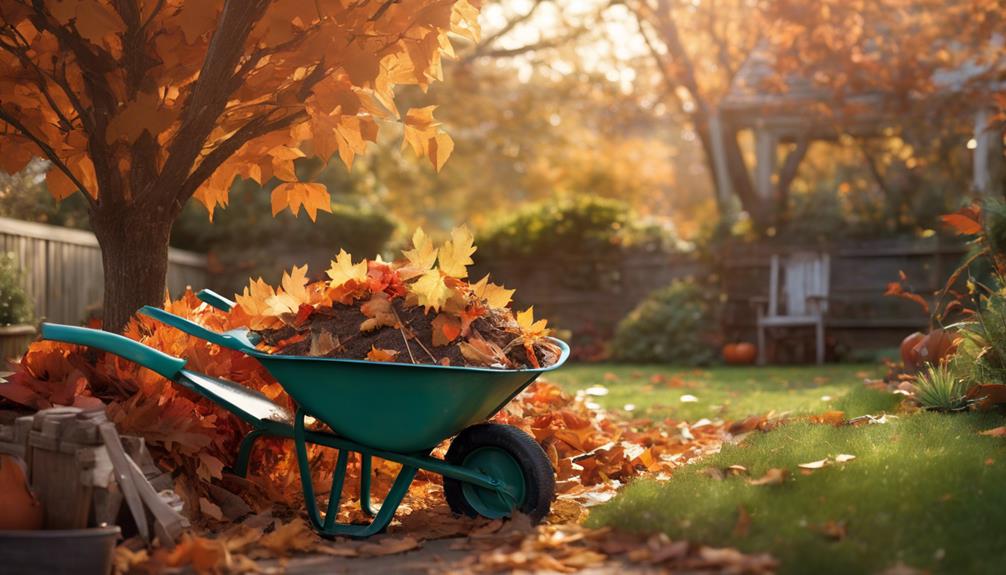
Tree Planting Northfield
18 January 2025
3 Best Eco-Friendly Lawn Care Services Near You
18 January 2025Seasonal garden cleanup services are essential for enhancing the health and aesthetics of your outdoor space.
These services improve soil vitality by removing debris that can harbour pests and diseases, while also facilitating better aeration and moisture retention.
Furthermore, they minimise competition for nutrients by eliminating weeds and dead foliage.
This proactive maintenance fosters robust plant growth and resilience, ensuring your garden thrives throughout the seasons.
Ultimately, investing in professional cleanup enhances the sustainability of your garden.
Discover how these practices can further transform your garden's health and beauty.
Seasonal Cleanup Enhances Garden Health
Seasonal cleanup is crucial for maintaining optimal garden health, as it directly promotes soil vitality by removing debris and enhancing nutrient availability.
Furthermore, this practice is essential in preventing pest infestations, thereby reducing the likelihood of disease and damage to plants.
Promotes Soil Health
Regular garden maintenance plays a crucial role in promoting soil health, as a thorough seasonal clean-up removes debris, dead plant material, and weeds that can harbour pests and diseases.
This proactive approach not only improves the visual appeal of the garden but also facilitates better aeration and moisture retention in the soil.
By clearing away organic matter that could decompose improperly, seasonal clean-up minimises the risk of nutrient depletion and fosters a balanced microbiome within the soil.
Furthermore, it allows for the timely incorporation of organic amendments, such as compost, which enrich the soil and support plant health.
Ultimately, a well-maintained garden provides a robust foundation for healthy plant growth, ensuring sustainable productivity and ecological harmony.
Prevents Pest Infestations
A thorough garden cleanup is essential for preventing pest infestations, as it eliminates potential breeding grounds for harmful insects and diseases. Fallen leaves, decaying plant matter, and debris provide ideal habitats for pests such as aphids, spider mites, and slugs.
By systematically removing these organic remnants during seasonal clean-ups, gardeners can disrupt the life cycles of these nuisances, greatly reducing their populations.
Moreover, a well-maintained garden improves air circulation and sunlight penetration, which are important in creating an inhospitable environment for pests.
Implementing seasonal clean-ups not only safeguards the aesthetic appeal of the landscape but also fortifies the general health of the garden.
Ultimately, proactive pest management through cleanup services is an investment in sustainable and thriving horticultural practices.
Soil Health and Nutrient Balance
Maintaining soil health and nutrient balance is essential for a thriving garden ecosystem.
Effective pest control and prevention strategies, along with practices such as mulching for moisture retention and composting for soil enrichment, play an important role in sustaining soil vitality.
Pest Control and Prevention
Effective pest control and prevention are essential components in promoting soil health and maintaining nutrient balance within your garden. Neglecting these factors can lead to detrimental effects on plant vigour and ecosystem sustainability.
To master pest management, consider the following:
- Integrated Pest Management (IPM): Employ a holistic approach that combines biological, cultural, and mechanical strategies to minimise pest impact while preserving beneficial organisms.
- Regular Monitoring: Conduct frequent inspections to identify pest populations early, allowing for timely interventions that protect your garden's health.
- Soil Amendments: Improve soil health through organic amendments, which foster resilience against pests by enhancing nutrient availability and microbial activity.
Mulching for Moisture Retention
How can mulching significantly enhance moisture retention in your garden? By creating a protective barrier, mulch greatly reduces evaporation, ensuring your plants receive the hydration they require.
This essential practice not only conserves water but also promotes healthier soil dynamics and plant growth.
Consider these compelling benefits of mulching:
- Moisture Conservation: Retains soil moisture, thereby reducing the frequency of watering.
- Temperature Regulation: Insulates the soil, maintaining ideal temperatures for root development.
- Weed Suppression: Minimises competition for water and nutrients, allowing your plants to thrive.
Incorporating mulching into your garden care routine is not merely a choice but a mastery of sustainable gardening that enhances both soil health and nutrient balance, fostering a flourishing ecosystem.
Composting for Soil Enrichment
Composting serves as a powerful tool for enriching soil, as it transforms organic waste into valuable nutrients that improve soil health and promote balanced ecosystems.
By integrating compost into your garden, you can achieve remarkable benefits that redefine your gardening experience:
- Enhanced Nutrient Availability: Compost provides vital nutrients, fostering vigorous plant growth and resilience.
- Improved Soil Structure: The incorporation of compost increases soil aeration and drainage, creating an ideal environment for root development.
- Microbial Diversity: Compost enriches the soil with beneficial microorganisms, which are important for maintaining a balanced ecosystem.
Garden Tool Preparation
Proper garden tool preparation is crucial for effective seasonal clean-up and promotes healthy plant growth.
Gathering the necessary tools, employing appropriate pruning techniques, and ensuring soil aeration can greatly improve root development and overall garden vigour.
Gather Necessary Gardening Tools
Preparing for seasonal garden cleanup requires a well-organised collection of important gardening tools.
The effectiveness of your cleanup efforts relies heavily on having the right instruments at hand. Make sure you gather the following necessary tools to achieve a masterful transformation of your garden:
- Pruning Shears – Sharp, precise shears are essential for cutting back overgrowth and shaping plants.
- Garden Rake – A sturdy rake is crucial for collecting leaves and debris, allowing for a clean slate.
- Trowel – A versatile trowel enables you to dig, plant, and transplant with accuracy.
Pruning Techniques for Healthy Growth
Effective pruning techniques are essential for promoting healthy growth in your garden.
Mastering these techniques not only improves the aesthetic appeal but also ensures the vitality of your plants.
Here are three key methods to consider:
- Selective Pruning: Remove only the dead or diseased branches, allowing the plant to concentrate its energy on healthy growth.
- Thinning: Enhance air circulation by selectively removing branches, thus reducing the risk of fungal diseases and encouraging vigorous growth.
- Heading Back: Trim back the tips of branches to stimulate bushier growth and promote flowering in many species.
Soil Aeration for Root Growth
A well-aerated soil is fundamental for promoting robust root growth and ensuring the overall health of your garden.
Soil aeration allows air, water, and nutrients to penetrate deeper, fostering an environment where roots can thrive.
To master this critical aspect of gardening, consider these key benefits of proper aeration:
- Enhanced Nutrient Uptake: Well-aerated soil improves the availability of essential nutrients, leading to healthier plants.
- Increased Water Infiltration: Aeration minimises surface runoff, allowing water to reach the roots more effectively, especially during dry spells.
- Root Expansion: By reducing soil compaction, aeration encourages roots to grow deeper, providing stability and resilience against adverse conditions.
Investing time in soil aeration will yield long-term rewards for your garden's health and overall beauty.
Improved Plant Resilience and Growth
Enhancing plant resilience and growth commences with thorough seasonal garden cleanup, which eliminates debris and fosters a healthier growing environment. A careful cleanup allows sunlight and air to permeate the soil, creating optimal conditions for root development.
| Benefits of Seasonal Cleanup | Impact on Plant Health |
|---|---|
| Removal of dead foliage | Reduces pest habitats |
| Clearing weeds | Minimises competition for nutrients |
| Soil aeration | Boosts root oxygenation |
| Mulching | Retains moisture and regulates temperature |
Seasonal Planting Strategies
Effective seasonal planting strategies are crucial for maximising garden productivity.
Key components include the timely application of fertilisers to promote growth, along with the use of organic fertilisers and herbicides tailored to seasonal needs.
Understanding these techniques can greatly improve plant health and yield throughout the growing season.
Fertilizer Application for Growth
When planning for seasonal planting, understanding the role of fertiliser application is crucial for promoting healthy growth.
A well-timed and appropriate fertiliser regimen can dramatically improve plant vitality and yield.
Consider the following key benefits of effective fertiliser application:
- Nutrient Availability: Ensures that plants receive essential nutrients such as nitrogen, phosphorus, and potassium, fostering robust development.
- Soil Health: Enhances soil structure and microbial activity, creating a thriving environment for root systems.
- Improved Resilience: Strengthens plants against pests and diseases, which is essential for sustainable gardening.
Organic Fertilizer Application Techniques
Incorporating organic fertiliser application techniques into seasonal planting strategies is crucial for promoting sustainable gardening practices.
Mastering these techniques not only improves soil health but also fosters vibrant plant growth.
Here are three effective methods to consider:
- Compost Tea Application: Infuse your soil with nutrients by steeping compost in water, creating a potent, natural fertiliser that increases microbial activity.
- Mulching with Organic Materials: Use shredded leaves or straw to enrich the soil as they decompose, improving moisture retention and nutrient availability.
- Crop Rotation: Alternate planting areas with nitrogen-fixing cover crops to naturally replenish soil nutrients and prevent depletion.
Seasonal Herbicide Application Techniques
Properly timed herbicide application is essential for managing weeds and ensuring optimal growth of desired plants throughout the growing season.
Mastering effective application techniques can greatly enhance your garden's health and aesthetics. Consider these key strategies:
- Targeted Timing: Apply herbicides during the early growth stages of weeds to optimise effectiveness while minimising harm to desirable plants.
- Environmental Conditions: Choose calm, dry days for application to prevent drift and ensure optimal absorption.
- Selective Products: Utilise products specifically designed for your types of plants to avoid unwanted damage.
Employing these techniques not only fosters a flourishing garden but also empowers you as a gardener, ensuring your efforts yield a thriving, vibrant landscape.
Your mastery over herbicide applications will elevate your gardening experience and results.
Pest Management Strategies
Effective pest management strategies are crucial for maintaining a healthy garden environment.
This includes implementing methods for weed control and utilising mulch to suppress their growth, which can notably reduce competition for resources.
Furthermore, adopting integrated pest management techniques ensures a balanced approach to controlling pests while minimising harm to beneficial organisms.
Effective Weed Control Methods
Implementing robust weed control methods is essential for maintaining a healthy garden ecosystem. Weeds compete with your plants for nutrients, water, and light, ultimately inhibiting their growth and flowering.
Mastering effective weed management strategies will empower you to cultivate a thriving garden. Consider the following methods:
- Hand Weeding: A meticulous approach that allows you to target specific weeds while minimising soil disruption.
- Cultural Practices: Implement crop rotation and plant dense ground covers to outcompete weeds naturally.
- Chemical Control: Use selective herbicides judiciously, ensuring they target only the unwanted species without harming your desired plants.
Mulch to Suppress Weeds
Applying a layer of mulch can significantly enhance your garden's defence against weeds while improving soil health.
This natural barrier not only suppresses unwanted plant growth but also conserves moisture and regulates soil temperature. Effective mulching can lead to a flourishing garden, exemplifying the mastery of horticultural practices.
Consider the following benefits:
- Weed Suppression: A thick layer of mulch blocks sunlight, preventing weed seeds from germinating.
- Soil Enrichment: Organic mulch breaks down over time, enriching the soil with valuable nutrients.
- Moisture Retention: Mulch assists in retaining soil moisture, reducing the need for frequent watering.
Integrated Pest Management Strategies
Integrated Pest Management (IPM) offers a comprehensive approach to controlling garden pests while minimising environmental impact.
This strategy combines various methods to ensure a balanced ecosystem, promoting sustainable gardening practices.
Consider the following crucial components of IPM:
- Monitoring: Regularly inspect plants to identify pest populations early, allowing for timely intervention.
- Cultural Controls: Implement practices such as crop rotation and proper plant spacing to reduce pest access and improve plant health.
- Biological Controls: Introduce beneficial insects, such as ladybirds and lacewings, to naturally suppress pest populations.
Why Choose TKL Birmingham Gardener
When it comes to maintaining the beauty and health of your garden, choosing TKL Birmingham Gardener ensures you receive top-quality services tailored to your needs.
Our team of seasoned professionals possesses extensive knowledge of horticulture, guaranteeing that every aspect of your garden is meticulously attended to. We utilise eco-friendly practices and advanced techniques, promoting sustainable growth while enhancing aesthetic appeal.
Furthermore, TKL Birmingham Gardener offers personalised consultations to align our strategies with your specific goals, whether it's optimising plant health or improving landscape design.
Our commitment to excellence is evident in our meticulous attention to detail and unwavering dedication to customer satisfaction. By selecting TKL Birmingham Gardener, you invest not only in the vibrancy of your garden but also in a collaborative partnership that prioritises your vision.
Common Gardening Questions Answered
Navigating the world of gardening can often raise a multitude of questions, particularly for those seeking to enhance their outdoor spaces. Common inquiries revolve around soil health, pest management, and plant selection.
Understanding soil composition is essential; a balanced mix of clay, silt, and sand promotes robust growth.
For pest control, integrating natural deterrents such as companion planting can be effective, minimising reliance on chemicals. Furthermore, selecting plants that thrive in your specific climate and soil type will yield the best results.
Consideration of local flora can bolster biodiversity and sustainability.
Plan for Seasonal Transitions
How can gardeners effectively prepare for the changing seasons? A strategic plan for seasonal shifts ensures your garden thrives throughout the year.
Mastering this skill will enhance the beauty and health of your outdoor space. Consider the following key actions:
- Assess Plant Health: Evaluate perennials and annuals to determine which require pruning or replacement to maintain vibrant growth.
- Soil Preparation: Test and amend your soil composition to verify ideal nutrient levels, promoting robust plant development.
- Timing of Planting: Schedule planting according to seasonal weather patterns, ensuring that plants are placed in the ground at the most advantageous times for growth.




